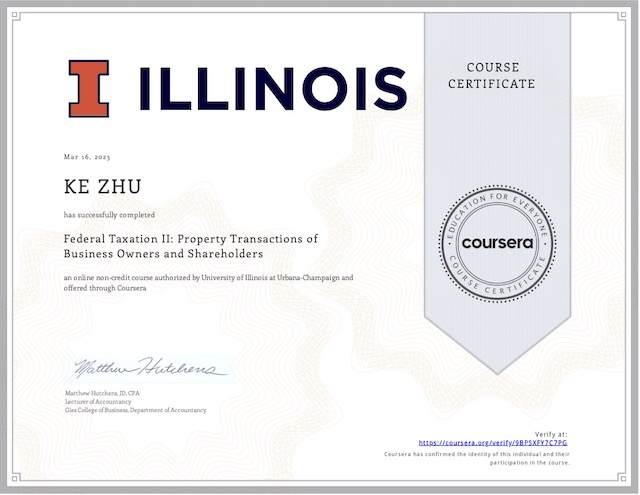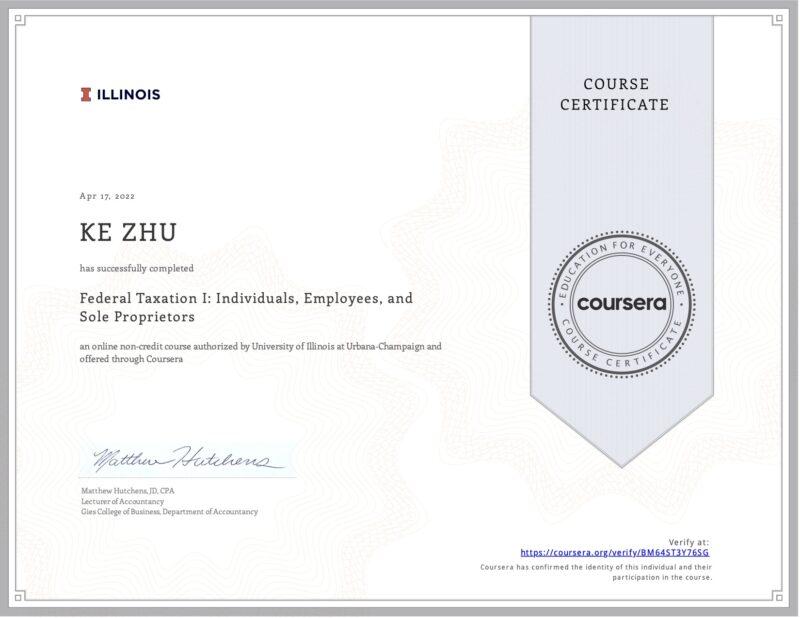Federal Taxation II: Property Transactions of Business Owners and Shareholders University of Illinois at Urbana-Champaign As individual or a business owner, have you ever googled questions like “Why are taxes so complicated?” There are quite many articles explaining the reason why. From the internet, I found this answer quite impressive: Our tax system could be…
Tag: Matthew Hutchens
Character of Gains and Losses, and The Netting Process
Recall there are a few key items when evaluating a property transaction: Also recall the holding period of a property technically begins on the day after the property is acquired and includes the day of properties disposition. Short-term holding period is where an asset is held for one year or less. Long-term holding period is…
Federal Taxation: Special Gain and Loss Provisions
In the last post, we looked at two major non-taxable exchanges: like-kind exchanges and involuntary conversions. In those transactions, any realized gain or loss is generally not recognized at the time of the transaction. Instead, realized gain or loss is deferred until some future point, usually when newly acquired property is ultimately disposed off. This…
Gains, Losses, and Non-Taxable Transactions
Overview of Gains and Losses At a very high level, it’s important to be able to calculate the gain or loss upon selling or exchanging an asset. Because, of course, gains are taxable and losses are deductible. That is, these kinds of property transactions will affect a business owners tax liability. In general, how do…
Depreciation, Amortization and Depletion
Cost Recovery What is cost recovery? For accounting purposes, businesses must capitalize the cost of assets, if the asset’s useful life is more than one year. Capitalization means that the cost of the asset purchase must show up on the balance sheet rather than as an expense on the income statement. What happens later is…
My #89 course certificate from Coursera
Federal Taxation I: Individuals, Employees, and Sole ProprietorsUniversity of Illinois at Urbana-Champaign I believe taxation is the negotiation between the governors and the governed. Yep, most of people don’t like taxes, however it is really rewarding if you know how the intricacies work. This is an “WOW” course that deserves your attention. Lots of stuff…
Itemized Deductions and Retirement Plans
Recall that the itemized deductions are also called “from AGI” deductions or below the line deductions. They are usually more personal in nature, including medical, taxes, interest and charitable, and not related to running a trade or business. It only provide a tax benefit to the extent, in total, they exceed the standard deduction amount….
Business Deductions
Employees vs Self-Employed What differentiates an employee from a self-employed individual (also known as independent contractor)? Employee If a person is subject to the will and control of another with respect to what job shall be done and how it shall be done. Then that person is more likely to be considered an employee rather than a self-employed…
Tax Deductions for Business, Hobby & Rental
Deductions are essentially the tax word for expense that can reduce the tax base. Deductions are disallowed unless a specific provision permits them. Deductibility depends on “legislative grace”. That is what Congress has decided to legislatively decree what is an allowable expense that can reduce the tax base. As a result, deductions are defined quite narrowly….
Gross Income for Individuals
Gross Income Gross income is all income from whatever source defined, it includes income realized in any form whether in money, property or services. If receive property or services, use Fair Market Value. Taxpayer recognize gross income when: They receive an economic benefit Increase in net worth (assets minus liabilities) Borrowed funds represent a liability,…
Computing the Tax
Income Tax Formula This is an important formula, you’ll use throughout the course and beyond. The US tax laws use all-inclusive income concept. We need to differentiate between “realized (economic) income” and “recognized income”. You realize economic income, when you have an exchange of property rights. “Recognized income” is part of “realized income” that is…










